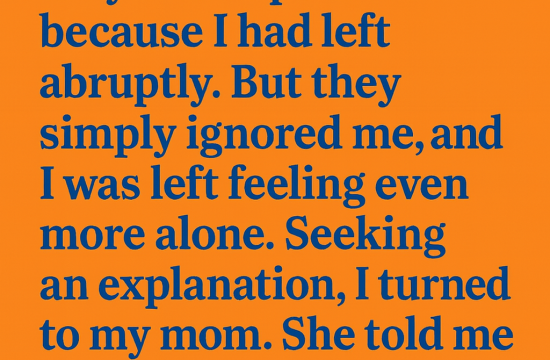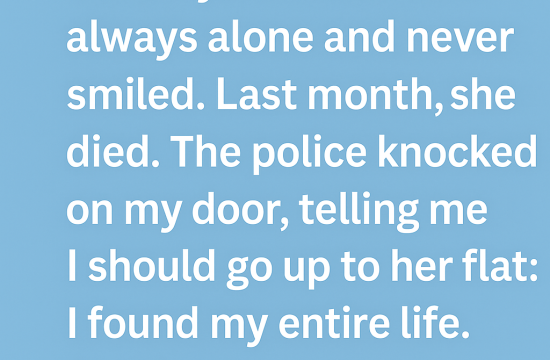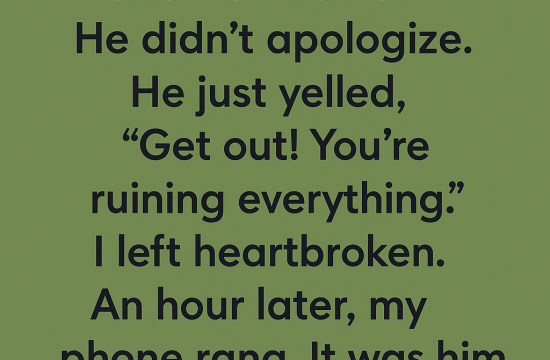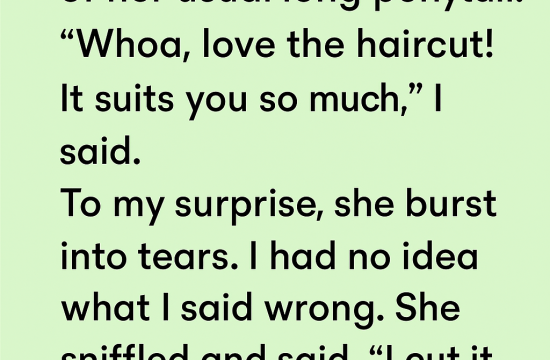It’s been six months since I lost my wife, Della, and some days it feels like I’m drowning in memories. Today was one of those days — until karma decided to show up fashionably late to the party.
But I’m getting ahead of myself. Let me rewind a bit to last week.
It was supposed to be a happy day: the 45th wedding anniversary of Della and her sister Lina’s parents. Instead, it turned into a nightmare that had me wishing I’d stayed home nursing my grief with a bottle of whiskey.
I stood in a corner of the living room, nursing a drink and trying to blend into the wallpaper. The chatter of family and friends washed over me, a dull roar that did nothing to drown the ache in my chest. Every laugh, every clink of glasses was a reminder that Della should’ve been here, lighting up the room with that crooked smile that used to make everyone softer.
That’s when it happened. The moment that made my blood run cold and then boil in the span of a heartbeat.
Lina appeared at the top of the stairs, and my world tilted. She was wearing Della’s engagement dress — the one I’d given her on the night I proposed, the one Della had treasured for years. It was a soft, flowing thing in a shade of blue that matched Della’s eyes perfectly. Seeing it on Lina felt like a violation.
I couldn’t move. Couldn’t breathe. My fingers tightened around my glass as Lina descended, a smug smile playing on her lips. She knew exactly what she was doing.
“Jack!” she called out, voice honey-laced with poison. “Don’t you think this dress is perfect for the occasion?”
I opened my mouth, but no words came. What could I say that wouldn’t cause a scene? That wouldn’t play right into her hands?
Lina sauntered over, eyes gleaming with malicious delight. “What’s wrong, Jack? Cat got your tongue?”
I forced a breath, and finally, with more quiet than I felt, I said, “That’s Della’s dress.”
She laughed — the kind of laugh that scratches at you. “Oh, come on. It’s not like she needs it anymore. And now,” she leaned in close, “she can’t say no to me.”
Something inside me snapped. I was about to unleash years of fury when Lina gasped dramatically.
“Oh no!” she cried. “I’m so clumsy!”
Time crawled as a dark stain spread across the front of the dress. A hand, a spill of red wine, and Lina’s eyes found mine — mock-innocent, triumphant. “Oops,” she said, sugar-coated. “I guess I ruined it. Such a shame.”
I don’t remember much of what happened next. I got through the rest of the party without committing murder. I drove home with my knuckles white on the steering wheel and the taste of bile in my mouth. Back in our — my — empty house, I paced like an animal in a cage. Memories of Della flooded me: her laugh, her small fierce kindness, the way she would have met Lina’s arrogance with calm and cold steadiness.
“God, I miss you, Del,” I whispered to the room. “You always knew how to handle her.”
I could almost hear Della’s voice folding into the silence. “Don’t let her get to you, Jack. She’s not worth it.”
It wasn’t only about me. It was about honoring Della’s memory, about not letting Lina trample the life we’d built together. I collapsed onto the couch, exhausted and heartsick. I wouldn’t seek revenge — that wasn’t Della. But I also wouldn’t stand in karma’s way.
A few days later, as I scrolled through social media to keep my hands busy, a post caught my eye. Lina’s face — mascara-streaked, dramatic — and the caption: “I was robbed yesterday! They took all my cocktail outfits and branded clothes. I’m devastated!” I blinked. Then the phone rang. Lina’s name flashed.
“You colossal jerk!” she howled when I answered. “I know it was you! How dare you?”
I listened. She accused me of every imagined slight. When she paused, I asked, “What are you talking about?”
“Don’t play dumb! My clothes — gone! All my designer outfits! Someone did this on purpose. It’s payback for the dress, isn’t it?”
Before I could answer, a message pinged across my screen. I looked down and nearly dropped the phone. Photos: Lina’s missing clothes — not in a thief’s stash, not in some grim flea market — but being worn by women on the street. A Gucci blazer on an elderly woman pushing a shopping cart. A Prada dress on a young mother cradling a baby. A Hermes scarf wrapped around a woman handing out sandwiches at a shelter.
I couldn’t hold it in. Laughter welled up from somewhere I hadn’t used in months. It felt rusty but true. “What’s so funny?” Lina demanded.
“Oh, Lina,” I said, still chuckling. “Maybe the universe has a charitable streak. Maybe someone thought your vanity would suit someone with less.”
“How dare you!” she sputtered. “I’m calling the police!”
“Go ahead,” I said, the calm in my voice surprising me. “They might be more interested in identifying whoever anonymously donated your closet to people who actually need clothes.”
I hung up before her screech could get worse, and I felt lighter than I had in months. Della used to say, half-amused, “One of these days she’ll push too far.” I raised an imaginary glass. “You called it, babe,” I murmured. “You always did.”
I thought that would be the end of it. A little karmic correction, a laugh, and maybe a lesson for Lina. But the universe — or someone working quietly with it — had one more scene to play.
The next morning an envelope lay on my welcome mat. Plain white, no stamp, my name handwritten across the front. Inside: a single sheet of paper with three words typed, blunt and unfussy: Don’t thank me.
That note could have been left by anyone: a cousin fed up with Lina’s cruelty, a neighbor who’d watched the sister torpedo so many family moments, a friend of Della’s who thought a small, sharp lesson was overdue. I flipped the paper over, but there was nothing else.
Word traveled fast. Within days, Lina’s melodrama became a cautionary family story. Neighbors who had once laughed at Lina’s barbed comments now kept their distance. A few relatives finally admitted, quietly and embarrassed, that they’d long tolerated her for the sake of peace. The more she protested, the more people noticed the pattern: Lina’s selfishness, her habit of turning every loss into a stage, her willingness to walk over another person’s grief for a laugh.
She raged and sputtered, but those outbursts only peeled away the last of her allies. The very things she prized — attention, status, designer labels — were the things that now made her look small and ridiculous. She tried to brand herself as a victim; most of the family just felt tired.
As for me, I did what Della would have done: I repaired what could be repaired and honored what couldn’t. I found a conservator who could remove the wine stain from Della’s dress — not to put it back in a closet, but to display it. I hung it in the spare room, with a small plaque that read, simply, Della — Loved. It wasn’t a shrine of bitterness. It was a quiet, deliberate piece of memory.
Several weeks later, at a small luncheon at the community center, I watched a woman — one of those who’d been pictured wearing Lina’s clothes — turn to a volunteer and say, with a smile that made her eyes light up, “Thank you. I haven’t had something pretty to wear in years.” The volunteer patted her hand. I felt something in my chest loosen. That was Della’s kind of victory: ordinary kindness given where it mattered.
Lina never apologized. She didn’t have to. Time did that for her in its own slow, certain way. Family gatherings became less performative; they became quieter, kinder. People who had been afraid to speak up started to set boundaries. In that change there was a kind of justice more enduring than any revenge I could have plotted.
On the anniversary of Della’s death, I stood in the living room and looked at that blue dress in its frame. I thought about the cheap thrill Lina had sought and how badly it had aged. I thought about the women who, by some anonymous kindness, had been warmed and restored by someone else’s vanity.
I still missed Della like a missing limb. Some nights the grief came back in a tidal wave. But the anger that had roared through me that night at the party had settled into something steadier — an acceptance that while people like Lina will always exist, they can be unmasked, and small, surprising acts can cut through them.
I never discovered who left the note. The anonymity suited it. Whoever did it wanted no fuss, only the correction. “Don’t thank me,” they had written. That line became, for me, a sort of miracle: an act of vindication performed without spectacle, without cruelty, and with a reserve of dignity that Lina had never understood.
I poured myself a drink, raised the glass to the empty room, and said what I always said when memory hit sharp: “To you, Della. For the quiet things that triumph in the end.”











